
Perhaps it happened as you walked past a mirror or caught your reflection unexpectedly—many of us have experienced that pervasive, self-critical thought: “I feel fat and ugly.”
This phrase is often rooted in deep-seated struggles with body image and self-perception that can shadow our daily lives. Behind these five words lies a complex web of emotions—shame, fear, and vulnerability—that resonates with the societal pressures and personal expectations we grapple with.
In this guide, we’ll explore the roots of poor body image and unravel the consequences of leaving it unaddressed. Then, I’ll provide plenty of evidence-based steps for gradually improving body image and self-acceptance. Together, we’ll uncover the roots of the thought, “I feel fat and ugly,” and learn how to extend kindness and acceptance to the parts of us that need it most.
On Feeling Fat and Unattractive: Rising Strong from Self-Criticism
Body image is more than just the reflection we see in the mirror; it’s the subjective perception we hold of our physical selves. This perception encompasses how we think, feel, and react to our bodies, but it doesn’t always align with reality. Why, then, do some of us harbor such harsh feelings towards our own body image?
For many, these negative self-perceptions are exacerbated by societal standards and expectations. The fear of social rejection, for instance, is significantly pronounced among individuals with higher body weight, leading to lower self-esteem and increased stress when their body size is visible to others.[1] The anticipated anxiety about judgment can cripple self-esteem and amplify thoughts like “I feel fat and ugly” even when it’s a misconception.
Some people argue that thoughts like “I feel fat and ugly” are somehow necessary to fuel growth, but the solution to poor body image isn’t to heighten self-criticism. Studies have shown that self-compassion, rather than self-criticism, is key to alleviating shame and fostering a healthier relationship with our bodies.[2]
Self-compassion encourages us to be kind to ourselves in the face of perceived flaws, allowing for emotional healing and resilience.
I’ve been there before, in the depths of depression, struggling with thoughts like “I hate my body” and “I feel fat” every day. I was riddled with so much shame about my body that I dreaded going to the gas station because I felt like anyone who looked at me was judging my belly rolls and acne. It made it very difficult to be an engaged participant in my own life.
This is why people don’t need to be hard on themselves to grow back stronger—especially people with body insecurity. People who struggle with thoughts like “I feel fat and ugly” don’t need to be any harsher on themselves. They need an abundance of self-compassion so that they can nurture themselves back stronger.
Causes & Symptoms of Poor Body Image
For those struggling with feeling unattractive, it’s crucial to understand the underlying causes. Awareness provides a foundation for empathy towards oneself and initiates the path to healing. Recognizing these causes helps in identifying personal triggers and understanding that these perceptions often stem from broader, complex issues beyond individual control.
Here are some potential causes of poor body image:
- Cultural and Media Influences: Persistent exposure to media that glorifies narrow beauty standards can distort one’s self-image, leading individuals to strive for unattainable and often unhealthy ideals.[3]
- Body Checking Behaviors: Frequent checking in mirrors, obsessive measuring of body parts, or constantly feeling one’s own body for perceived flaws are behaviors known as body checking. These compulsive acts can reinforce negative self-perceptions and exacerbate thoughts like, “I feel fat and ugly.” By continuously scrutinizing their appearance, individuals may become more fixated on minor imperfections, leading to increased dissatisfaction and distress.
- Family Dynamics and Upbringing: Comments from family members about weight and appearance can significantly impact one’s body image. These remarks can embed deep-seated feelings of inadequacy that persist into adulthood.[4]
- Psychological Factors: Conditions like anxiety and depression can skew self-perception, leading to negative body image. These mental health issues can magnify minor concerns into major sources of distress.[5]
- Physical Changes: Life stages such as pregnancy or menopause may alter body image due to physiological changes, which can challenge one’s self-esteem and sense of identity.[6]
- Social Comparisons: Engaging in comparisons with others, often fueled by social media, can exacerbate body dissatisfaction. This can perpetuate a cycle where individuals feel constantly inferior to the unrealistic standards they observe online.[3]
Understanding the causes of poor body image enhances self-awareness and understanding, paving the way for greater compassion towards oneself. Additionally, recognizing the potential consequences of leaving poor body image unaddressed can inspire proactive steps towards change.
Here are some of the potential effects of poor body image:
- Decreased Mental Health: Poor body image can lead to depression, anxiety, and low self-esteem, severely impacting one’s mental health and creating a barrier to pursuing personal goals and enjoying life.
- Social Withdrawal: Feelings of inadequacy can lead to avoiding social situations, thus increasing isolation; this can exacerbate feelings of loneliness and further entrench negative self-perceptions.
- Eating Disorders: Negative body image is a well-documented risk factor for the development of eating disorders, which can have severe health consequences.[7] These disorders often require professional treatment to overcome.
- Body Dysmorphia: Defined in the DSM-5 as a preoccupation with perceived flaws in one’s appearance, body dysmorphic disorder (BDD) often involves distressing repetitive behaviors like excessive grooming, excessive weight lifting, or excessively comparing one’s appearance to others.[8] The relentless focus on supposed physical imperfections can consume vast amounts of time, disrupt daily functioning, and necessitate professional psychological intervention.
- Physical Health Risks: Negative body perceptions can lead to harmful behaviors like disordered eating or excessive exercising, impacting physical health.[9]
- Impaired Day-to-Day Functioning: Body dissatisfaction can distract from daily activities and responsibilities, reducing overall life satisfaction and productivity; this can hinder performance at work or school and impact personal relationships.
It’s clear that self-critical thoughts such as “I feel fat and ugly” can set off a troubling cycle of negative consequences that make it increasingly difficult to be an engaged participant in one’s own life. These effects not only deteriorate body image further but also lay the groundwork for continued self-criticism. Fortunately, there are evidence-based strategies available that can disrupt this cycle and foster a gradual improvement in body image over time.
How to Improve Body Image and Grow Beyond “I Feel Fat and Ugly”
Transitioning from understanding the roots and ramifications of poor body image, let’s explore actionable steps to reconstruct a healthier perception of oneself. The path to fostering self-acceptance and self-empowerment begins with action.
Here are some steps that you can take to gradually improve body image:
1. Recognize the Influence of Diet Culture Behind Thoughts Like “I Feel Fat and Ugly”
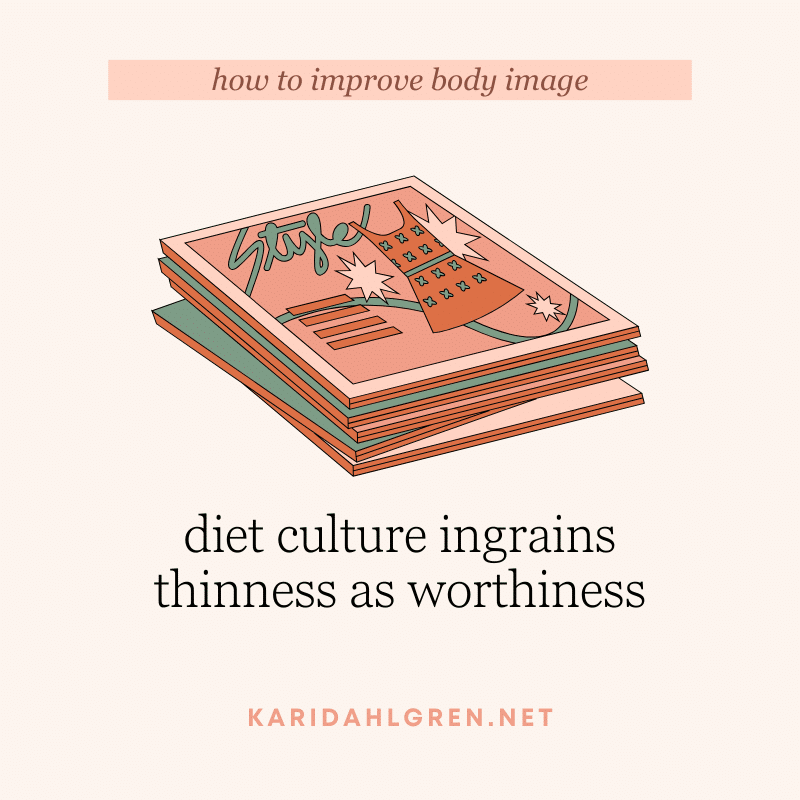
Diet culture, with its relentless promotion of thinness as the epitome of health, success, and desirability, fuels self-critical thoughts like “I feel fat and ugly.” This obsession with a narrow beauty standard is magnified by social media, where filtered images often create unrealistic body expectations. Studies confirm the damaging impact of these platforms, with one highlighting a direct link between social media use and increased body dissatisfaction and disordered eating among female university students.[3]
Research involving women in their 60s and 70s reveals widespread body dissatisfaction and significant instances of disordered eating behaviors, underscoring the necessity for interventions that extend beyond youth.[10]
To counteract diet culture, it helps to diversify media consumption to foster an environment where self-acceptance is the norm and harmful stereotypes are actively challenged. Here are some examples:
- Unfollow Influencers Who Promote Unrealistic Beauty Standards: Take control of your social media feeds by unfollowing accounts that perpetuate the thin ideal or that frequently use heavily edited images.
- Follow Body Neutral Accounts: Actively seek out and follow accounts that promote body diversity and respect, including those that feature people of all sizes, shapes, and backgrounds.
- Respond to Body Comments: If someone comments on your body, address it directly by explaining the impact of such remarks and advocating for boundaries and body respect in future interactions.
- Engage in Activities That Promote Self-Esteem: Participate in activities that make you feel good about yourself, unrelated to appearance, such as hobbies, sports, or learning new skills.
- Mindful Consumption of Media: Be critical of the media you consume and teach others, especially young people, to view media with a critical eye.
Implementing these steps can help reduce the prevalence and impact of negative self-perceptions like feeling unattractive, which promotes a healthier, more inclusive view of beauty that celebrates all bodies.
2. Stop Dieting: It’s About Empowerment, Not Defeat
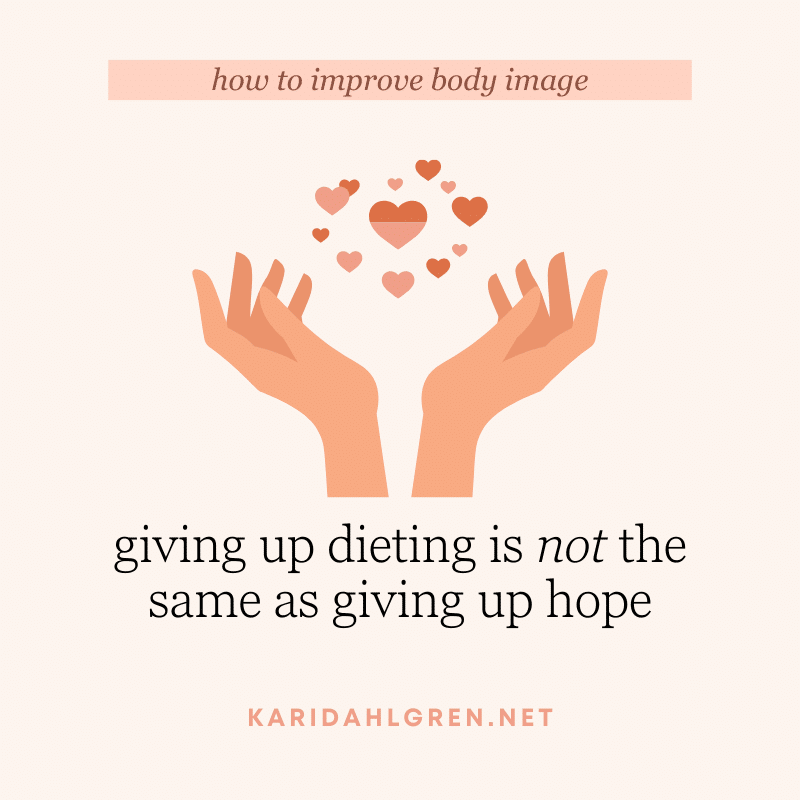
Dieting, often seen as a quick fix for body dissatisfaction, can ironically perpetuate negative self-images. The practice of restrictive eating tends to set unrealistic expectations, focusing on short-term losses rather than long-term health and well-being. When diets impose severe restrictions—especially on foods that individuals enjoy—this can lead to increased cravings and, paradoxically, overeating.[11]
The cycle often goes like this: restriction leads to cravings, which lead to binge eating, followed by guilt, depression, negative body image, and more dieting.[12] The restrict-binge cycle not only undermines a person’s sense of control and autonomy but also often results in weight regain, fueling further body dissatisfaction and the recurring thought, “I feel fat and ugly.”[13]
Breaking free from this cycle involves a shift towards empowerment rather than defeat, emphasizing body respect and intuitive eating over caloric restrictions. Here are some practical steps to help guide this transition:
- Tune Into Your Body’s Cues: Learn to recognize and respect your body’s signals of hunger and fullness. Eating should be in response to physical hunger, not because a diet plan dictates what and when you can eat.
- Diversify Your Diet: Instead of cutting out foods, focus on incorporating a wide variety of nutrients into your meals. By embracing an “all foods fit” approach, it not only improves overall health but also helps reduce feelings of deprivation.
- Set Realistic Goals: Focus on achievable, non-weight-related health goals, such as improving strength, enhancing endurance, or boosting your mood daily.
By shifting the focus from strict diet adherence to nurturing your body and honoring its needs, you pave the way for a healthier relationship with food and a more positive body image.
3. Use the Urgent Desire to Feel Less Puffy As a Compass
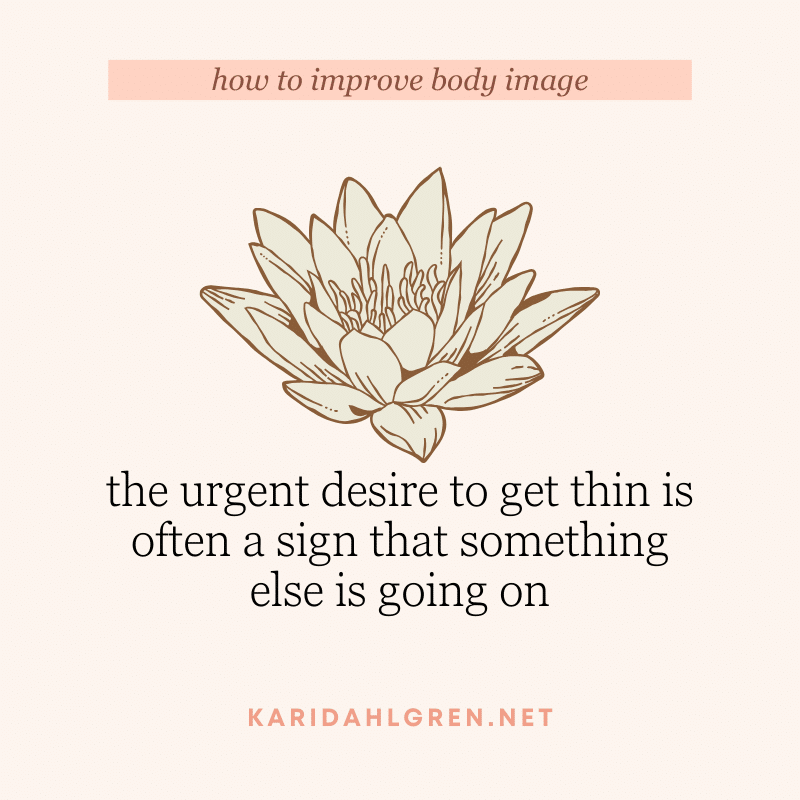
Along with ditching diet culture and dieting itself, we can actually use the thought “I feel fat and ugly” as an unexpected path to personal growth. This is not about toxic positivity. It’s about recognizing that when the need to alter our appearances becomes urgent, it can be a profound indicator of unresolved and challenging emotions seeking our attention.
Rather than dismissing the desire to “fix” physical appearance as mere vanity or weakness, we can approach them with compassion and curiosity. These emotions act as messengers, inviting us to explore the deeper layers of our inner selves.
For example, let’s say that I am really struggling with ‘feeling fat’ and I feel an urge to restrict my diet to regain a sense of control. If I were to do an emotional check-in (e.g. the Stop, Drop, & Feel) in that precise moment, I may stumble upon a strong emotion like loneliness or rejection.
Perhaps a friend just moved away and I am actually feeling sad; but without awareness of that emotion, it can become deflected into thoughts like “I feel fat and ugly” and then preoccupation with appearance serves as a maladaptive coping mechanism for those difficult feelings.
By recognizing that the thought “I feel fat and ugly” can indicate the presence of unidentified and unaddressed emotions, we open the door to self-discovery. It’s an opportunity to extend empathy to ourselves and nurture the parts within us that long for acceptance and understanding.

It's a spiritual journey: Use your relationship with food and body image as a compass guiding you home. Get the full scoop in my free ebook, The Spiritual Seeker’s Guide to Stop Binge Eating.
4. Take Up Yoga—It Helps with Body Perception
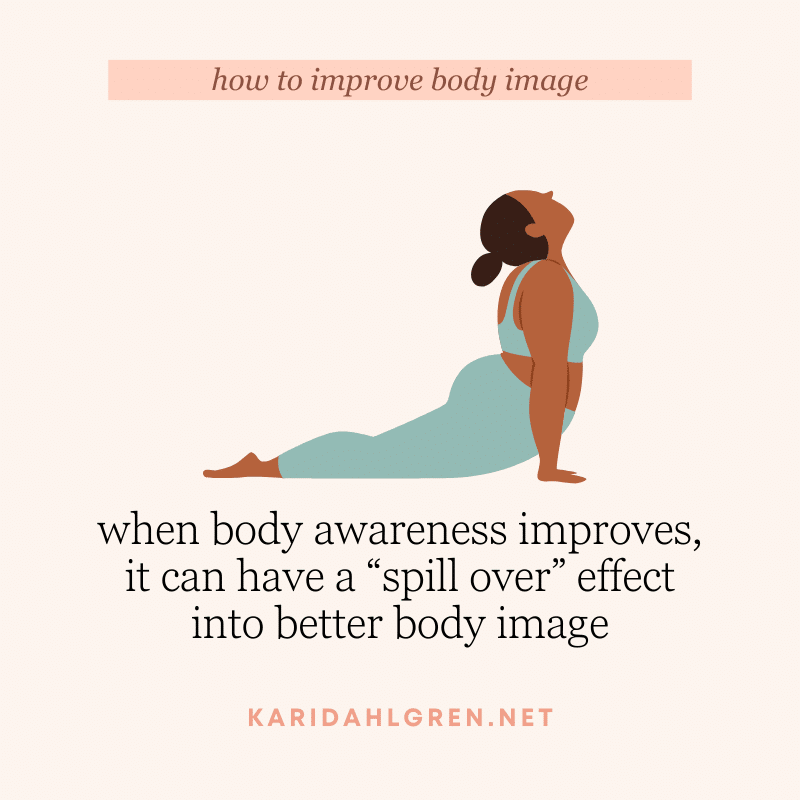
If self-critical thoughts like, “I feel fat and ugly” are coupled with heightened stress, it may be linked to changes in proprioception. This refers to a vital biological system that provides us with an awareness of our body parts in relation to one another.
Research suggests that stress can significantly distort the way we perceive our bodies by altering our internal sensory experiences.[14] Thankfully, there’s a powerful tool to help improve proprioception: yoga. Through the practice of yoga, we slow down, engaging in controlled body movements that foster a strong mind-body connection.
Keep in mind that many yoga studios have wall-to-wall mirrors, which can create a challenging environment for some and may even exacerbate poor body image and drive for thinness. If your local yoga studio has an excessive number of mirrors, consider opting for at-home yoga or even outdoor yoga for some fresh air.
5. Explore Somatic Paths to Self-Acceptance
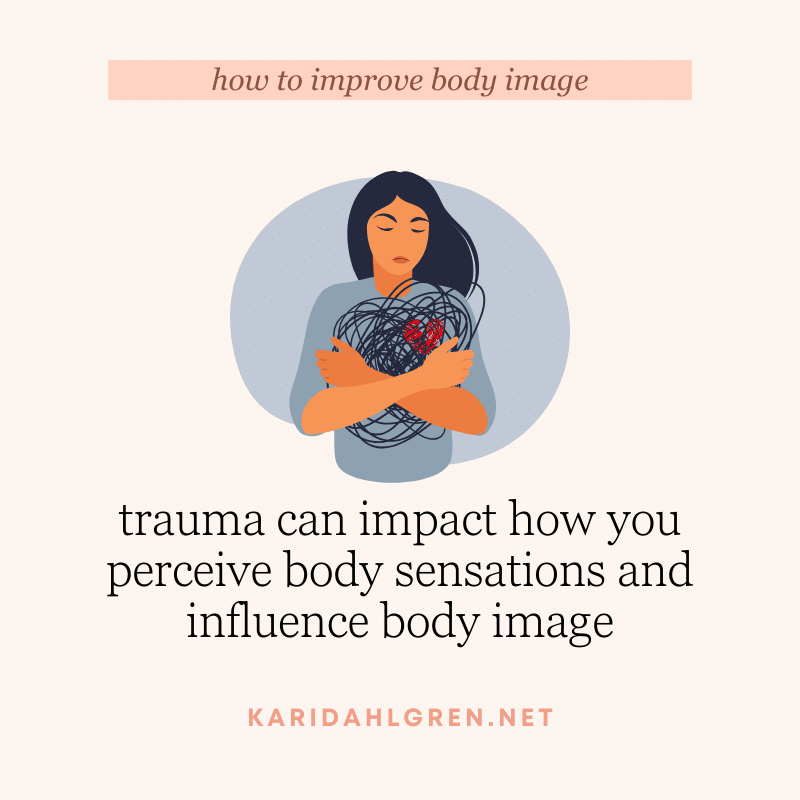
Poor body image can often stem from past trauma, which disrupts a person’s ability to accurately perceive and respond to their bodily sensations. This disruption can lead to a profound sense of disconnection or discomfort with one’s own body.
Somatic Experiencing, developed by Peter A. Levine, offers a compelling framework for healing negative body image. This approach emphasizes the awareness of interoceptive cues—internal bodily sensations—and proprioceptive cues —the sense of body position and movement. Through this enhanced awareness, it helps individuals resolve and heal from the underlying trauma, fostering a healthier body image.
Here’s how you can actively incorporate this approach to improve negative body image:[14]
- Tune Into Body Signals: Allocate a few minutes daily to close your eyes and feel the sensations across your body—your stomach, chest, feet—without judgment. Because thoughts like, “I feel fat and ugly,” have trained the brain to gravitate towards self-criticism, it’s okay if it’s difficult to scan your body without judgment at first. Over time, however, body scanning helps shift your focus from appearance to bodily sensations, diminishing the influence of external judgments.
- Respond to Natural Cues: Be attentive to fundamental needs such as hunger, thirst, and rest. Responding to these cues helps rebuild trust in your body and mitigate the self-loathing tied to negative body image.
- Grounding Exercises: When negative body thoughts surface, perform grounding exercises like feeling your feet on the ground or touching different textures. These bring you back to the present, steering you away from critical thoughts.
- Slow and Gentle Movements: Participate in activities like yoga or gentle stretching, concentrating on the movement sensations. This enhances body awareness and calms the mind, aiding in stress management and reducing negative body image intensity.
By shifting the focus from how your body looks to how it feels, you encourage a kinder and more accepting relationship with your body. This approach not only improves your body image and reduces thoughts like “I feel fat and ugly,” but also enhances your overall emotional and psychological well-being.
6. Acknowledge Your Shared Humanness
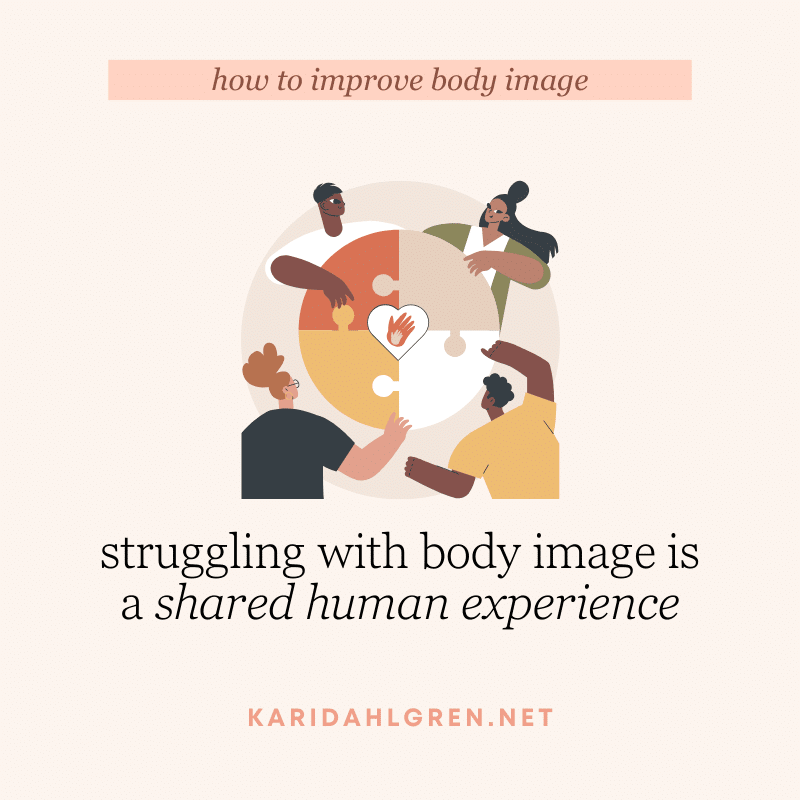
When you encounter the distressing thought, “I feel fat and ugly,” try to remind yourself that you’re not alone. Such thoughts are part of our shared humanness, as no one is exempt from self-doubt. Acknowledging your shared humanness is a pillar of self-compassion, according to renowned psychologist and expert in self-compassion, Kristin Neff.
However, self-critical thoughts can become an isolating experience if shame causes us to feel like we are the only ones struggling. Shame thrives in secrecy, and by acknowledging that many people struggle with feeling unattractive, it can help dismantle the shame storm.
7. Gently Work Towards Better Emotional Awareness
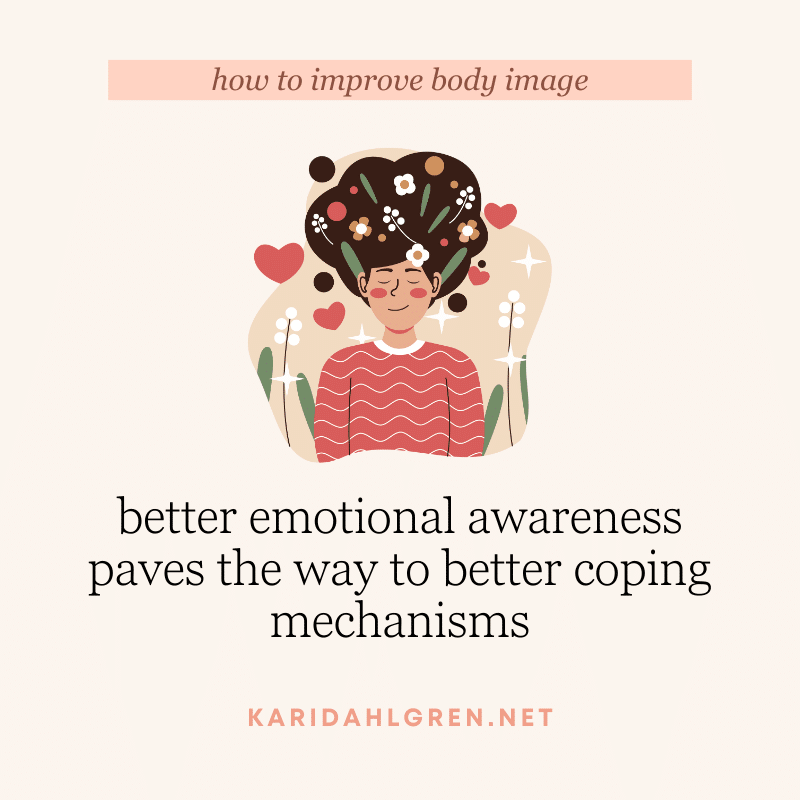
Many argue that ‘fat isn’t a feeling,’ and this phrase—as well-meaning as it is—can unintentionally shame those struggling with poor body image by demanding more precise language when what the individual really needs is less self-criticism and more self-compassion.
Sure, fat is not a term in Oxford’s emotional dictionary, but for many, "feeling fat" is a genuine emotional state that reflects deep-seated insecurities and societal pressures related to body image—so it’s a valid expression of emotional distress.
If you find yourself thinking or saying, “I feel fat,” first meet yourself where you are and honor your humanness. Then, use these tips to improve the skill of emotional awareness over time.
Acknowledge and Validate Your Feelings: Understand that your feelings are valid responses to internal and external pressures about body image. Acknowledging “I feel fat” as an emotional state can help you start to unpack what you’re really feeling, whether it’s anxiety, sadness, inadequacy, or something else.
Identify Underlying Emotions: Try to identify the specific emotions linked to the sensation of feeling fat. Are you actually feeling anxious, stressed, rejected, or insecure? Naming these emotions accurately can help you address the root cause of your distress.
Additionally, a negative self-image often triggers negative emotions, increasing the likelihood of emotional eating. By enhancing your emotional awareness and accurately labeling your feelings, you can more effectively choose non-food coping mechanisms to deal with challenging emotions.
8. Seek Professional Support
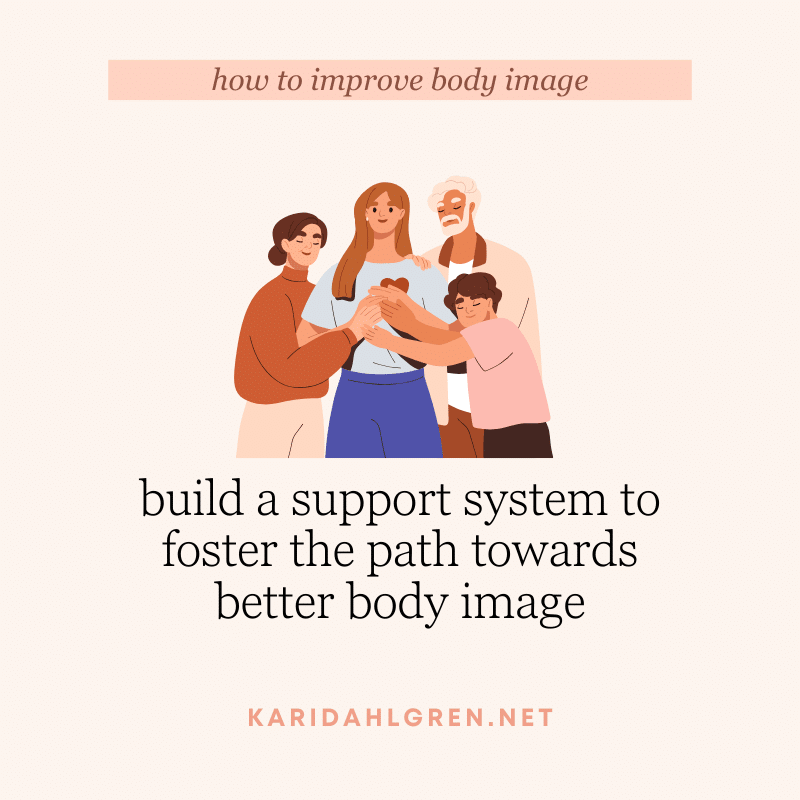
Last but certainly not least, when feelings of poor body image are overwhelming, it’s crucial to seek support. Reaching out to the right professional(s) can provide the guidance necessary to navigate the complex emotions involved in thoughts like “I feel fat and ugly.”
Here are some experts that can help:
- Psychologists: Trained to diagnose and treat mental health issues including body dysmorphic disorder, psychologists use therapies like cognitive-behavioral therapy to address negative thought patterns related to body image.
- Licensed Clinical Social Workers: These professionals offer counseling and support, helping individuals to manage stress and develop healthier coping mechanisms in daily life.
- Dietitians: Experts in nutrition, dietitians can assist in creating eating plans that nourish the body and mind, reinforcing a positive body image without focusing solely on weight.
- Health and Wellness Coaches: As an eating psychology coach, I deeply understand the complex link between eating behaviors and emotional health. If you’re struggling with feelings about your body and food, know that you’re not alone. I’m here to offer compassionate support and effective strategies to help you cultivate a more nurturing and positive relationship with food and body image.
Consulting with these professionals, whether one or several, is a proactive move towards enhancing your mental and physical well-being. Each expert plays a unique role in supporting your journey towards improved self-perception, empowering you with tools to rebuild your relationship with yourself. By seeking support, you ensure that you’re not just coping, but thriving.
Shifting from ‘I Feel Fat and Ugly’ to ‘I Deserve My Own Compassion’
Your journey towards self-compassion and body acceptance is a process—unique and evolving, just like you. When faced with thoughts like “I feel fat and ugly,” remember that you are not alone in grappling with these emotions. They are part of the shared human experience, and acknowledging this is a powerful step towards self-compassion.
Choosing empowerment over defeat, let go of restrictive diets and embrace the somatic experience of truly feeling your body sensations—beyond just surface appearances. Understand that your worthiness is not tied to a number on the scale, but rather to the unique qualities and strengths that define you.
Above all, as you work to deprogram thoughts like “I feel fat and ugly,” remember to extend the same kindness, curiosity, and compassion to yourself as you would to a cherished friend. You deserve the same goodness that you share with others.



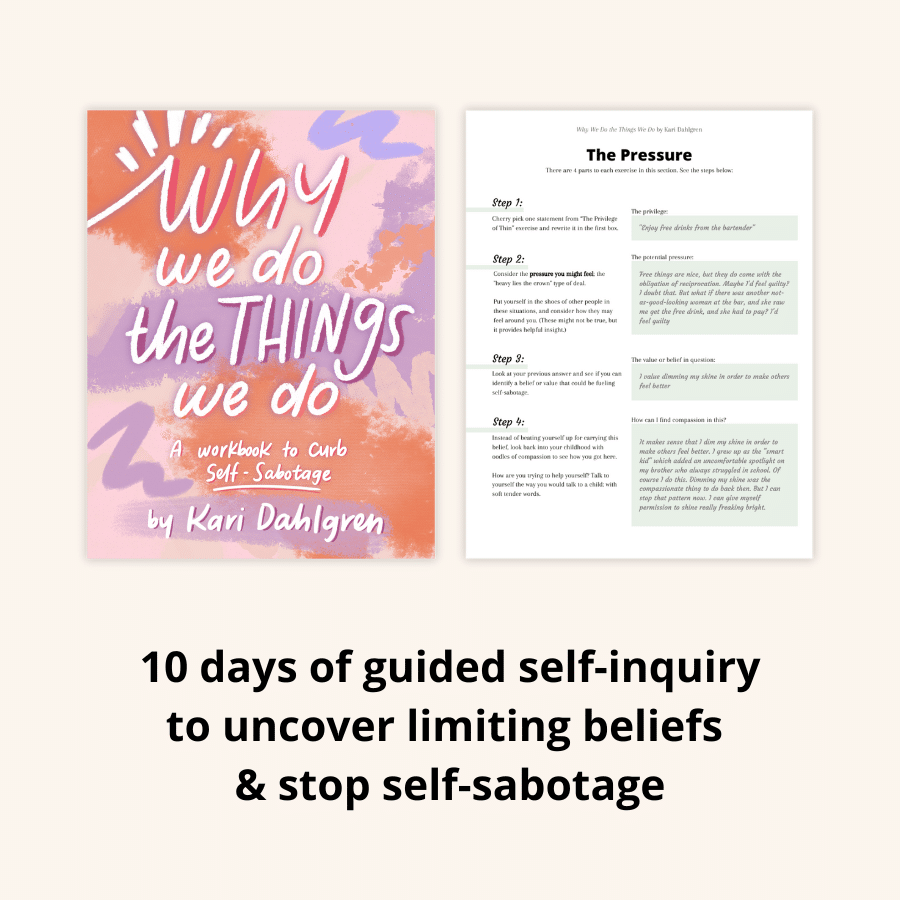
Thank you so much for this! I would never talk to anyone about their weight issues the way I actually would look in the mirror and say horrible things to myself. I don’t do that anymore as I have learned to accept myself as I am and for the positive attributes I have. I have learned to “Deserve my own compassion” as you mentioned. I do still struggle a little when I have those “Feeling Fat and Ugly” days but I’m not mean to myself anymore. My children and grandchildren love me unconditionally and I used to say “I wonder why” but I now accept their love (and love for myself) with open arms.
Oh my gosh, so much YES! Getting to a place where you can let yourself be loved, and accept other peoples’ compliments, can be a hard-won journey. Congrats Patricia!! Amazing!!
Love ur content!!
Thank you Ingrid!!!
I really love this post because I find these “fat & ugly” thoughts and moods to be the part of overeating that hurts the most. I enjoy being in water when I feel this way. Thank you for the other ideas!
Thanks for the comment Sally!! Water is one of my favorites too. The ocean, swimming pool… if it has water, it has the potential to soothe the soul.
I really LOVE this! Thank you for sharing. Reading it has really helped me bring my perfectionist self-critic a little more under control, and I am feeling really empowered. I am just at the start of this journey, but I am loving all the content I have seen so far and finding you so inspiring and uplifting. You are really helping! Thank you. xo
🙂
Awe, I’m so glad Drina! I know how deep those pits can get, where we feel awful about ourselves, and if I can help shine a light in that dark place, I count myself lucky. And I am glad you’re here!! xo
Keep re reading this it’s so good.
I have decided that if I feel like going on a juice diet for a couple days then I have permission to do that. What I am starting to do is NOT beat myself up when I stop. I just let the crazy loose knowing you help me stop and feel good no matter what I do as its under my control.
One day I will work out what to do with those pesky feelings.
Please keep going with your amazing emails.
I love this so much!! It seems like you’re taking a massive step towards self-compassion and that is a big deal!!! Congrats Ange. Thanks for the comment <3
It’s still difficult when you’ve been put down your whole life and rejected your whole life because I’m too fat and too ugly. Nothing ever seems to get better. The only thing I’ve ever wanted my entire life was to have someone by my side but being too fat and too ugly got in the way EVERY time! No woman, will ever be with me because ugly, fat guys don’t get to be happy. That’s just the way it is and nothing has ever changed that in my 55 years.
Hi Kevin, thank you for sharing this with me and with anyone else that’s reading who may relate to the struggle. I think there’s a lot of truth to “thin privilege” and “pretty privilege” (or in this case, “handsome privilege”) and so I think the way you feel is valid. I think the frustration is valid, and I hope that you can accompany these feelings with compassion too. You are so worthy of compassion, especially your own. <3
Hi! Excellent and honest article! These fat and ugly feelings escalate especially with pms. Water retention does make me feel fat, heavy, bloated, even more so than “normally”. I try as much as I can hide in those days! I feel then shame, more than the “usual” amount of shame. Being woman is difficult sometimes, beauty standards are stressful, this world, life, feels often crazy, scary, overwhelming 🙁 Tiny voice inside me screams, mercy, I am only a human being!
I’m 40+ years so I have struggled with fat and ugly feelings long time by now. Interesting thing is, I have never really been what is considered obese, as a young woman naturally skinny, now in my 40s, normal weight and little bit more, but just and just what is so called normal weight. That does not stop the feeling of fat 🙁
Just yesterday, out of the blue, maybe it was the voice of inner wisdom or intuition, this very powerful thought came into my mind: Could I be at peace with myself, at peace with my body, even if other people, the society, the culture is NOT at peace with my body? I think I really could!! If for no other reason, at least to unleash the little inner rebel 😀
So much of the suffering comes from, my negative thoughts about my body, is because I stress what other people think about it, which I assume is equally negative and judgemental. What if I don’t actually need other people’s thoughts, opinions, judgments, likes or dislikes, acceptance or whatever about my body? I realised, my body is mine, it keeps me alive and that is a reason enough to love it!
Of course, I don’t want to look like garbage, I want to do self care, do my best, but that’s all I can do and that has to be enough 🙂
Hi Anna!! Thank you so much for sharing your experience. Dealing with the societal pressures around appearance can feel like such an isolating experience sometimes, and it’s definitely exhausting!! And telling your story is a powerful way to take back your power. I am so glad to hear that you already had a powerful epiphany. I hope you continue this wonderful trajectory of self-compassion, you deserve it!!!